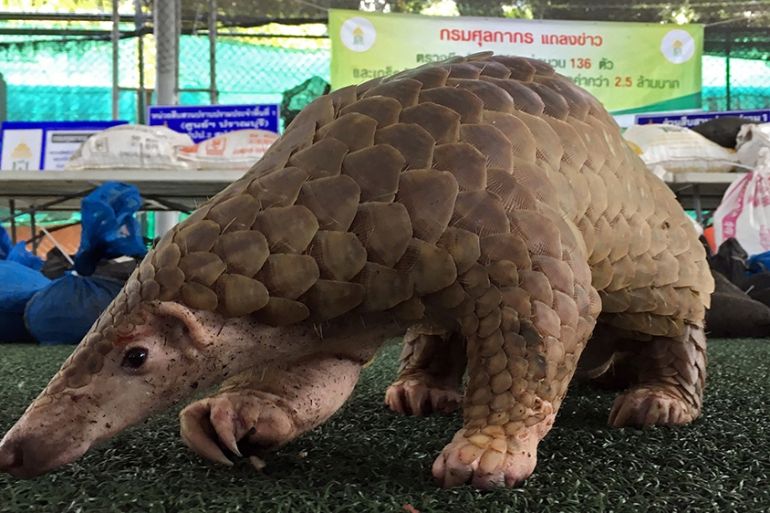By the numbers: Illegal wildlife trade threatens species
Vietnamese wildlife trafficking networks drive global trade in elephant, pangolin, tiger and rhino parts, report finds.

Conservation groups are imploring world leaders to take action to protect vulnerable and endangered species from the illegal wildlife trade at a time when biodiversity “is declining faster than at any time in human history,” according to a report from the Intergovernmental Science-Policy Platform on Ecosystem Services (IPBES), a United Nations partner organisation.
More than 180 parties to the Convention on International Trade in Endangered Species of Wild Fauna and Flora (CITES) will meet in Geneva on Saturday. CITES regulates trade in more than 30,000 species of plants and animals that are used for food, clothing, cosmetics, medicine and housing.
Keep reading
list of 4 itemsMalaysia plans ‘orangutan diplomacy’ in palm oil pitch
‘First time’: Wild orangutan performs self-medication
Three Eswatini chiefdoms overcome rivalry to preserve indigenous forest
This year’s World Wildlife Conference comes after a recent report found that some of the world’s most endangered and vulnerable animals are being trafficked in record numbers through Vietnam and the country is doing too little to stop it.
The report – issued by the nonprofit Environmental Investigation Agency – found Vietnam’s “out-of-control, illegal wildlife trade” has helped drive demand globally, and that the Southeast Asian nation is now “the leading destination for illicit ivory”.
Vietnam is implicated in more than 600 seizures related to the illegal wildlife trade, including a minimum of 105.72 tonnes of ivory, 1.69 tonnes of rhinoceros horn, the bodies and scales of 65,510 pangolins and the skins, bones and other products from a minimum of 228 tigers, the EIA report found.
The products are being trafficked from Africa and other parts of Asia for Vietnamese consumption and for transit into China, Myanmar and Laos, among other places. Some of the animals are killed so that their skins, horns and tusks can be used as decorations; others, including pangolins and rhinoceros, are killed for use in traditional Chinese medicine.
Pangolins are the world’s most-trafficked mammal, and the eight species found in Africa and Asia range from vulnerable to critically endangered, according to the World Wildlife Fund. An estimated one million pangolins have been trafficked in the past decade alone, according to the WWF. Leaders at this year’s World Wildlife Conference will specifically look at measures to protect pangolins, the organisation said.
Time is running out to stem the tide of illegal poaching and trafficking, conservationists warn. Many of the animals that have been trafficked through Vietnam are endangered or extremely vulnerable. There are only about 3,900 tigers and fewer than 5,000 black rhinos left in the wild, according to the WWF.